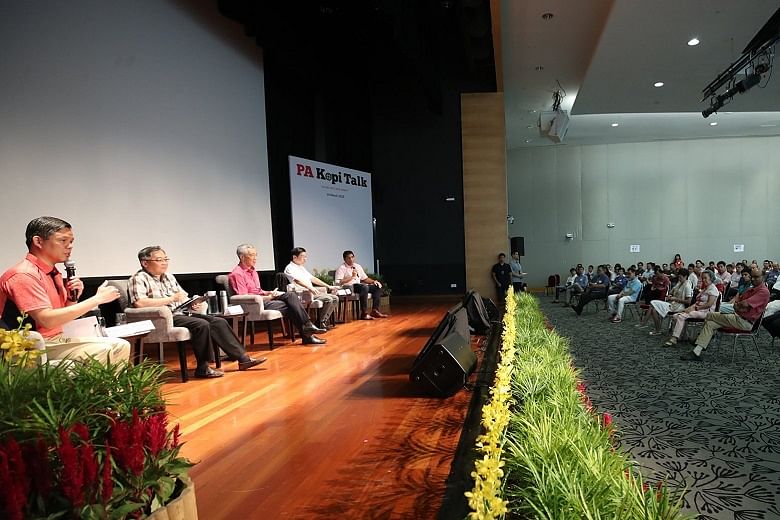Date of general election will depend on what will best see Singapore through Covid-19 situation, says PM Lee
Sign up now: Get ST's newsletters delivered to your inbox

(From left) Trade and Industry Minister Chan Chun Sing, Health Minister Gan Kim Yong, Prime Minister Lee Hsien Loong and National Development Minister Lawrence Wong at ITE College Central on March 14, 2020.
PHOTO: LEE HSIEN LOONG/FACEBOOK
SINGAPORE - The date of the next general election will depend on what will best see Singapore through the major crisis posed by the coronavirus pandemic, said Prime Minister Lee Hsien Loong.
Singapore faces grave and extended challenges, he said in a Facebook post on Saturday (March 14), noting that the Covid-19 outbreak will likely last at least this year, and quite possibly longer.
"I fully expect things to get more serious before they start getting better," he said, adding that Singapore has two options ahead.
The first is to hope and pray that things will stabilise before the end of the term, so that elections can be held under more normal circumstances. "But we have no certainty of that," he said.
"Or else call elections early, knowing that we are going into a hurricane, to elect a new government with a fresh mandate and a full term ahead of it, which can work with Singaporeans on the critical tasks at hand."
If elections have to be held before Covid-19 is over, all necessary precautions will be taken so that parties can campaign effectively, and people can vote safely, PM Lee added.
"At stake are jobs, businesses and lives."
The timing of the election depends on the situation and the outlook, he said.
He noted that the GE can be called only after the electoral registers are updated, which will take about a month.
The next general election has to be held before April 21, 2021.
The Prime Minister's remarks came a day after new electoral boundaries were announced.
The release of the Electoral Boundaries Review Committee's report has prompted multiple opposition parties to call for the Government to delay the election till the coronavirus outbreak has been contained.
Associate Professor Bilveer Singh from the National University of Singapore said PM Lee's post "makes it quite clear" the GE will be held very soon - within the next two months, or latest by June.
It is advantageous for the ruling party to do so, notwithstanding the Covid-19 crisis, he added, pointing to how it has won plaudits for its handling of the outbreak.
In his post, PM Lee said he held a dialogue on Saturday morning with grassroots leaders on Covid-19 and what lies ahead for Singapore.
"Fighting Covid-19 is difficult enough. But we also need to deal with Covid-19's enormous impact on our economy," he said.
The economic fallout will likely be more serious than the global financial crisis, and longer-lasting too, even beyond the end of the pandemic, he added.
"Covid-19 may well turn out to be the crisis that defines this generation of Singaporeans. We must gird ourselves to overcome this together, and show the world what Singapore can do."
With the release of the committee's report, the next step is for Parliament to be dissolved, and the Writ of Election issued.
Nomination Day must take place at least five working days from the date of the writ.
From Nomination Day, there will be at least nine days of campaigning and one Cooling-Off Day before Singaporeans head to the polls.
In its report, the committee recommended increasing the number of elected Members of Parliament from 89 to 93.
There will be 14 Single-Member Constituencies (SMCs) and 17 Group Representation Constituencies (GRCs), up from 13 SMCs and 16 GRCs in the 2015 GE.
PM Lee's Ang Mo Kio GRC was among the constituencies that saw changes - it will be downsized from six members to five, with Yio Chu Kang ward carved out as a single seat.
It will also take in parts of Sengkang West SMC which lie on the west side of Sungei Punggol.
The rest of the single-seat will be merged into a new four-member Sengkang GRC, along with Punggol East SMC and parts of Pasir-Ris Punggol GRC.
In all, just over 13 per cent of voters will find themselves in a new constituency, compared with the 19 per cent of voters affected by boundary changes ahead of the 2015 election.
Former People's Action Party (PAP) MP Inderjit Singh noted that if the ruling party waits too long, it could face a situation where the polls have to be held when the outbreak is more severe than it is now.
And the Government's assessment is that things will likely get worse, he said. So the thinking is to quickly hold the election and put a strong government in place with a new five-year term to tackle the fallout from Covid-19, he added.
"From the PAP's perspective, this is the best time (to have an election)," he said. "When people have a siege mentality, they will go for safety and a proven government."


